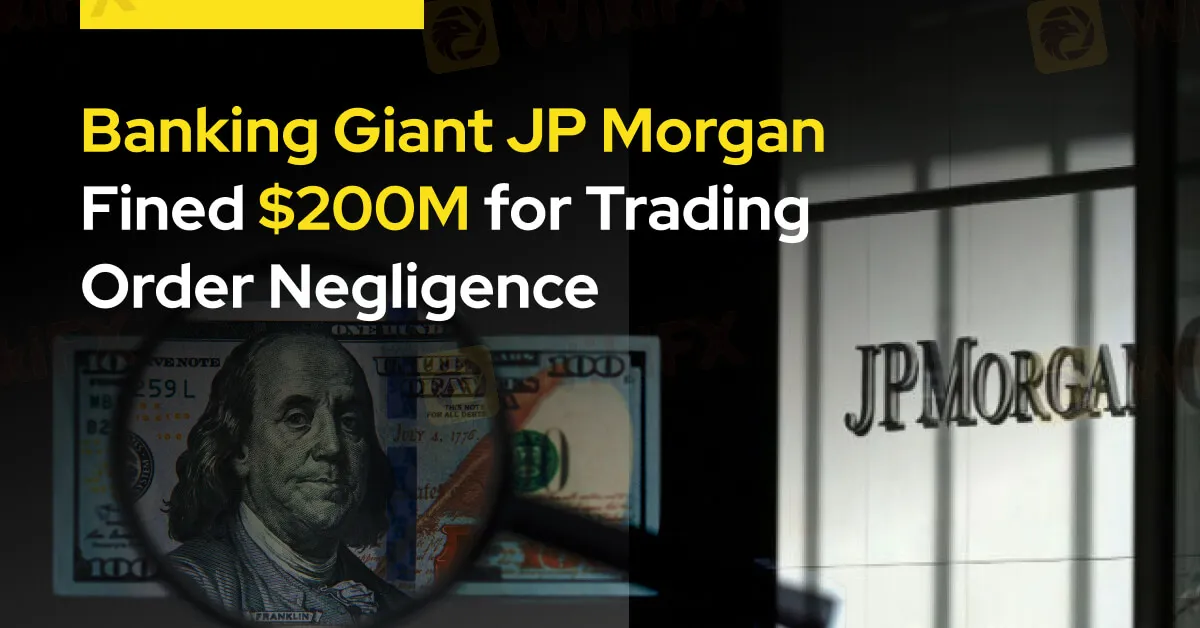简体中文
繁體中文
English
Pусский
日本語
ภาษาไทย
Tiếng Việt
Bahasa Indonesia
Español
हिन्दी
Filippiiniläinen
Français
Deutsch
Português
Türkçe
한국어
العربية
Banking Giant JP Morgan Fined $200M for Trading Order Negligence
Abstract:The Commodity Futures Trading Commission (CFTC) has settled charges against J.P. Morgan Securities LLC, a registered futures commission merchant and swap dealer, with a $200 million civil monetary penalty

The Commodity Futures Trading Commission (CFTC) has settled charges against J.P. Morgan Securities LLC, a registered futures commission merchant and swap dealer, with a $200 million civil monetary penalty. This penalty will be offset by $100 million, contingent on payments made pursuant to a related resolution with JPMorgan Chase Bank.
J.P. Morgan admitted to failing to diligently supervise its business, resulting in the failure to capture billions of orders in its surveillance systems. The CFTC emphasized that the resolution includes a significant penalty, certain factual admissions, and the appointment of a consultant to ensure remediation. The commission aims to convey a clear message that CFTC registrants must take appropriate steps to ensure, through testing and other means, that complete trade and order data direct from exchanges are being ingested into trade surveillance systems and that orders are being properly monitored.

In 2021, during the onboarding of a new trading exchange, J.P. Morgan discovered that its surveillance of trading on multiple venues and trading systems was not operating correctly. This issue resulted in substantial gaps in J.P. Morgans trade surveillance on these venues, highlighting a significant oversight in their compliance processes.
The surveillance gaps stemmed from J.P. Morgan's failure to configure certain data feeds to ensure that complete trade and order data were ingested by its surveillance tools. This technical misconfiguration led to a failure in monitoring billions of order messages over an extended period.
On a designated U.S. contract market, J.P. Morgan failed to ingest into its surveillance systems—and thus did not monitor—billions of order messages from 2014 through 2021. These unmonitored messages largely consisted of sponsored access trading activity for three significant algorithmic trading firms. J.P. Morgan has since represented that the surveillance gaps were fully remediated by 2023, addressing the compliance shortcomings identified.
Furthermore, J.P. Morgan had a quarterly reconciliation process in place to ensure the completeness of some order and trade data ingested into certain surveillance systems. However, it did not apply this process to direct-from-exchange data feeds. This oversight was based on an erroneous assumption that data directly from an exchange was a “golden source” and did not require testing. This assumption proved to be a critical error, leading to significant gaps in their surveillance capabilities.
The CFTC's resolution with J.P. Morgan underscores the critical importance of rigorous supervision and comprehensive data monitoring within financial institutions to maintain market integrity and compliance. The appointment of a consultant to oversee the remediation process is intended to ensure that such lapses do not occur in the future, reinforcing the need for continuous and thorough oversight in trading activities.
This settlement serves as a stark reminder to all CFTC registrants about the essential need for robust surveillance systems and diligent supervision practices, be it for big established firms or new budding organizations. Ensuring the completeness and accuracy of trade and order data is always fundamental to the integrity of the trading markets and the protection of investors.

Disclaimer:
The views in this article only represent the author's personal views, and do not constitute investment advice on this platform. This platform does not guarantee the accuracy, completeness and timeliness of the information in the article, and will not be liable for any loss caused by the use of or reliance on the information in the article.
Read more

Is KODDPA a Ponzi Scheme?
Recent allegations have cast a dark shadow over the trading platform KODDPA. Once positioned as a promising player in the broker industry, KODDPA now faces serious questions regarding its integrity and legitimacy. Multiple recent incidents—including widespread account disputes, claims of system hacking, and demands for users to pay taxes for fund withdrawals—suggest that the platform may be operating far from the transparent, regulated environment it purports to provide.

Why Hope is Your Worst Enemy in the Stock Market
In the world of equity investing, few forces are as quietly destructive as the investor’s own sense of hope. This psychological trap often known as the "illusion of luck" convinces retail investors that they are among the fortunate few who can defy market logic. More often than not, it ends in losses, disillusionment, and a harsh lesson from the market.

No Recession in Forex? Is Forex Better Than the Stock Market?
As equity markets recently convulse under the pressure of rate uncertainty, geopolitical risk, and weakening macroeconomic signals, an age-old question resurfaces: when the stock market shakes, is it time to look elsewhere?

Why Studying A Lot Doesn’t Work | When Technical Analysis Fails
Technical analysis is the go-to toolkit for countless investors. Candlestick patterns, moving averages, MACD signals, Elliott Waves—you name it, there’s a chart or model for it. Many spend years perfecting their craft, poring over price patterns and back testing strategies. Yet, despite all this effort, a large number still lose money. The reason? It’s not the tools as they’re merely instruments. It’s the human behind them that falters. In particular, wishful thinking and emotional bias often sabotage disciplined execution.
WikiFX Broker
Latest News
Why Joining an Online Trading Community is Essential for Success
Southeast Asia Cracks Down on Scam Centers: Human Trafficking and Fraud Exposed
No Recession in Forex? Is Forex Better Than the Stock Market?
Why Hope is Your Worst Enemy in the Stock Market
What Type of Forex Trader Are You?
Scope Market (RS Global Ltd.) Accused of Unauthorised Deductions & Suspensions
Is KODDPA a Ponzi Scheme?
Nigeria’s Gas Boom: A New Era of Energy Investment
eToro Launches Stock Lending Program to Empower Retail Investors
Banks and Tech Giants Unite to Fight UK Fraud Surge
Currency Calculator


